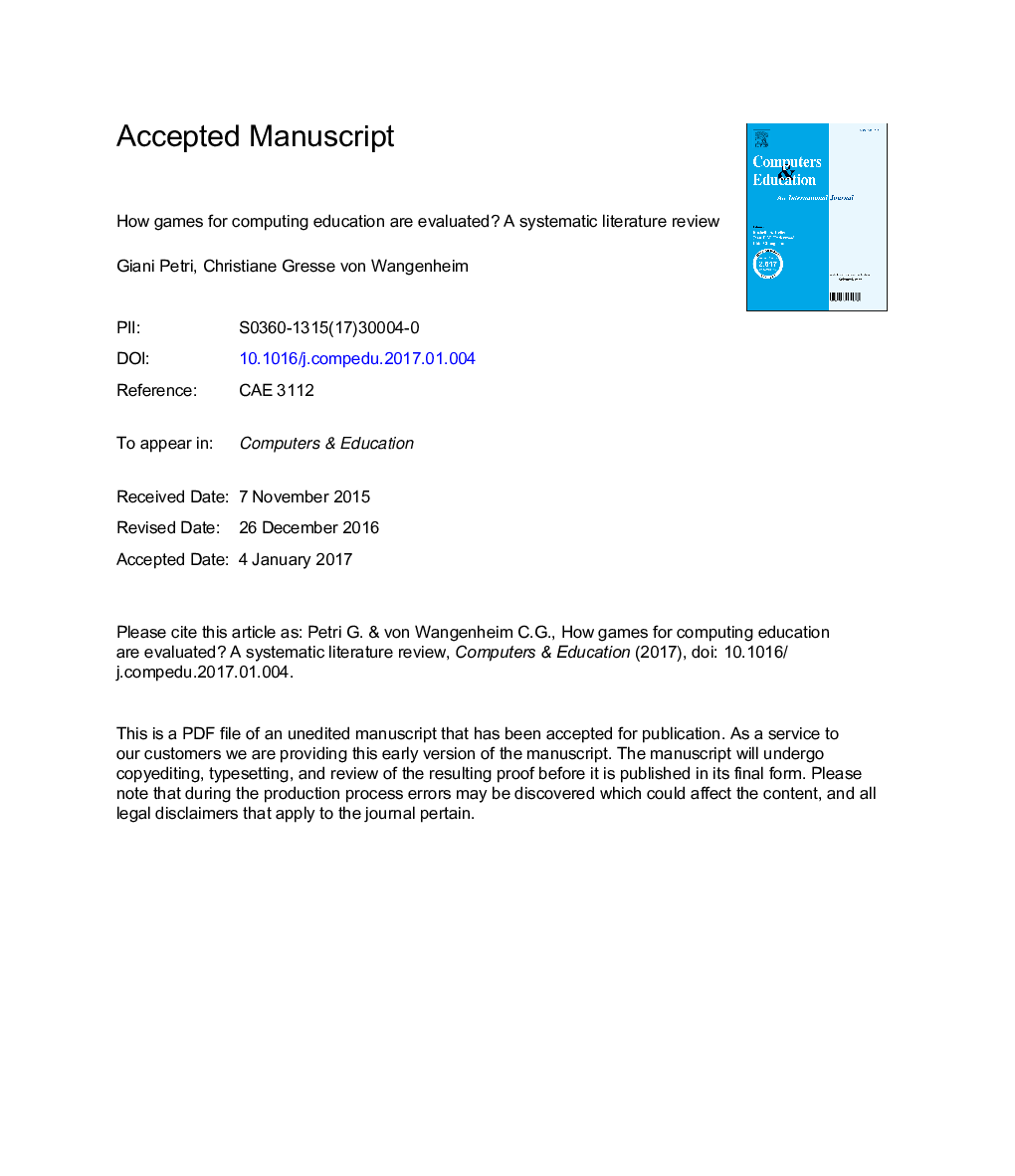| کد مقاله | کد نشریه | سال انتشار | مقاله انگلیسی | نسخه تمام متن |
|---|---|---|---|---|
| 4936881 | 1434541 | 2017 | 28 صفحه PDF | دانلود رایگان |
عنوان انگلیسی مقاله ISI
How games for computing education are evaluated? A systematic literature review
ترجمه فارسی عنوان
چگونه بازی برای آموزش محاسبات ارزیابی می شود؟ بررسی ادبیات سیستماتیک
دانلود مقاله + سفارش ترجمه
دانلود مقاله ISI انگلیسی
رایگان برای ایرانیان
کلمات کلیدی
ارزیابی، بازی آموزشی آموزش محاسبات، بررسی ادبیات سیستماتیک، علوم کامپیوتر،
ترجمه چکیده
بازی های آموزشی به عنوان یک استراتژی آموزشی مؤثر و کارآمد برای محاسبه آموزش هستند. با این حال، برای ارزیابی سیستماتیک چنین بازیهایی ضروری است تا شواهد صحیح از تاثیر آنها را بدست آورند. بنابراین هدف این مقاله، ارائه وضعیت هنر در مورد نحوه ارزیابی بازی ها برای محاسبات آموزشی است. بنابراین، ما یک بررسی ادبی سیستماتیک از نمونه ای از 3617 مقاله انجام دادیم که از آن 112 مقاله مربوطه شناسایی شده است و 117 تحقیق در مورد ارزیابی بازی ها برای محاسبات آموزش دیده است. بر اساس این مطالعات، ما تجزیه و تحلیل کردیم که چگونه ارزیابی ها تعریف می شوند (عوامل تحلیلی، طرح های پژوهشی، مدل ها / روش های ارزیابی، نوع ابزار جمع آوری داده ها و غیره)، نحوه اجرای آنها (اندازه نمونه و تکثیر) و تجزیه و تحلیل (داده ها روش های تجزیه و تحلیل) در نتیجه می توانیم تأیید کنیم که اکثر ارزیابی ها از یک طرح پژوهشی ساده استفاده می کنند که در آن معمولا بازی مورد استفاده قرار می گیرد و پس از آن بازخورد ذهنی از طریق پرسشنامه های یادگیرندگان جمع آوری می شود. اکثریت ارزیابی ها با نمونه های کوچک اجرا می شود بدون تکرار، با استفاده از روش های کیفی بیشتر برای تجزیه و تحلیل داده ها. ما همچنین مشاهده کردیم که بیشتر مطالعات از یک مدل یا روش ارزیابی به خوبی تعریف نشده استفاده نمی کنند. این نشان می دهد که نیاز به ارزیابی دقیق تر و همچنین پشتیبانی متدولوژیک برای کمک به سازندگان بازی و مربیان برای بهبود این بازی ها و همچنین به طور سیستماتیک حمایت از تصمیم گیری در مورد زمان و چگونگی آنها را در واحد های آموزشی وجود دارد.
موضوعات مرتبط
علوم انسانی و اجتماعی
علوم اجتماعی
آموزش
چکیده انگلیسی
Educational games are assumed to be an effective and efficient instructional strategy for computing education. However, it is essential to systematically evaluate such games in order to obtain sound evidence of their impact. Thus, the objective of this article is to present the state of the art on how games for computing education are evaluated. Therefore, we performed a systematic literature review of a sample of 3617 articles from which 112 relevant articles have been identified, describing 117 studies on the evaluation of games for computing education. Based on these studies we analyzed how evaluations are defined (the analysis factors evaluated, research designs, evaluation models/methods used, kind of data collection instruments, etc.), how they have been executed (sample size and replications) and analyzed (data analysis methods used). As a result, we can confirm that most evaluations use a simple research design in which, typically, the game is used and afterwards subjective feedback is collected via questionnaires from the learners. The majority of the evaluations are run with small samples, without replication, using mostly qualitative methods for data analysis. We also observed that most studies do not use a well-defined evaluation model or method. This shows that there is a need for more rigorous evaluations as well as methodological support in order to assist game creators and instructors to improve such games as well as to systematically support decisions on when or how to include them within instructional units.
ناشر
Database: Elsevier - ScienceDirect (ساینس دایرکت)
Journal: Computers & Education - Volume 107, April 2017, Pages 68-90
Journal: Computers & Education - Volume 107, April 2017, Pages 68-90
نویسندگان
Giani Petri, Christiane Gresse von Wangenheim,
